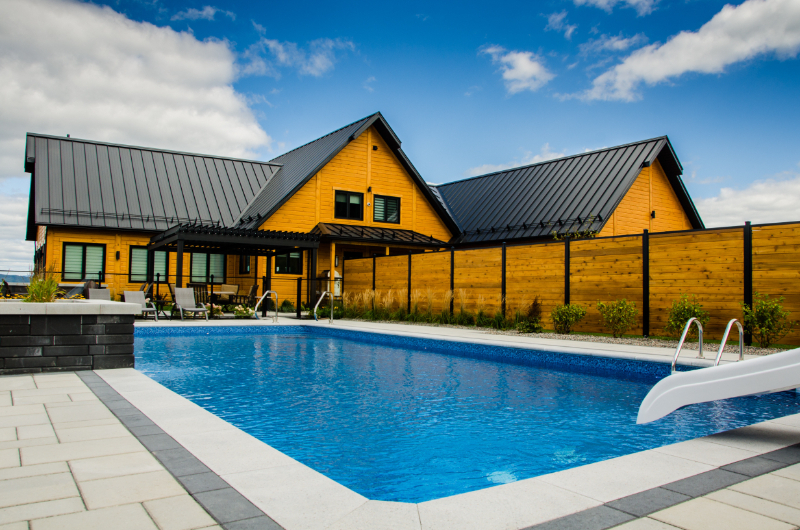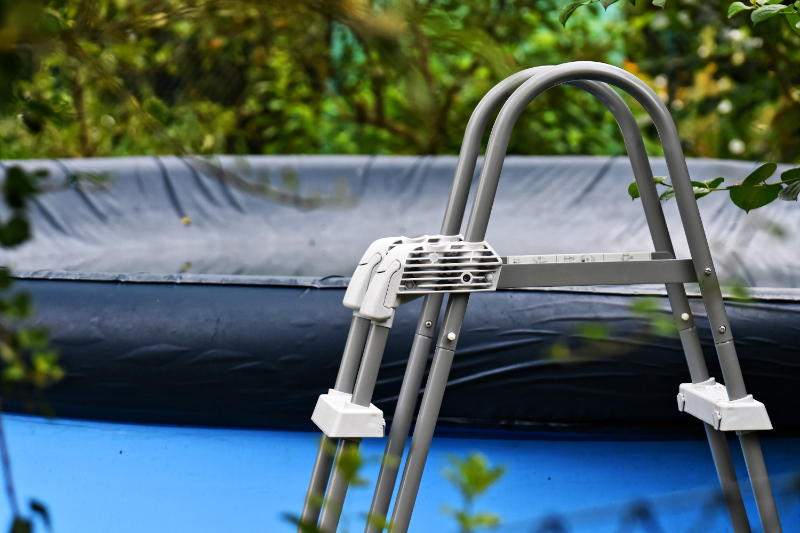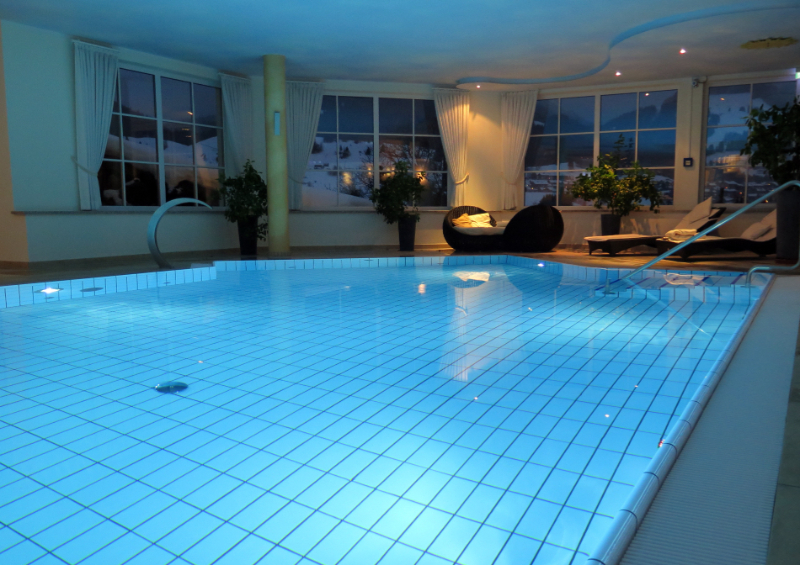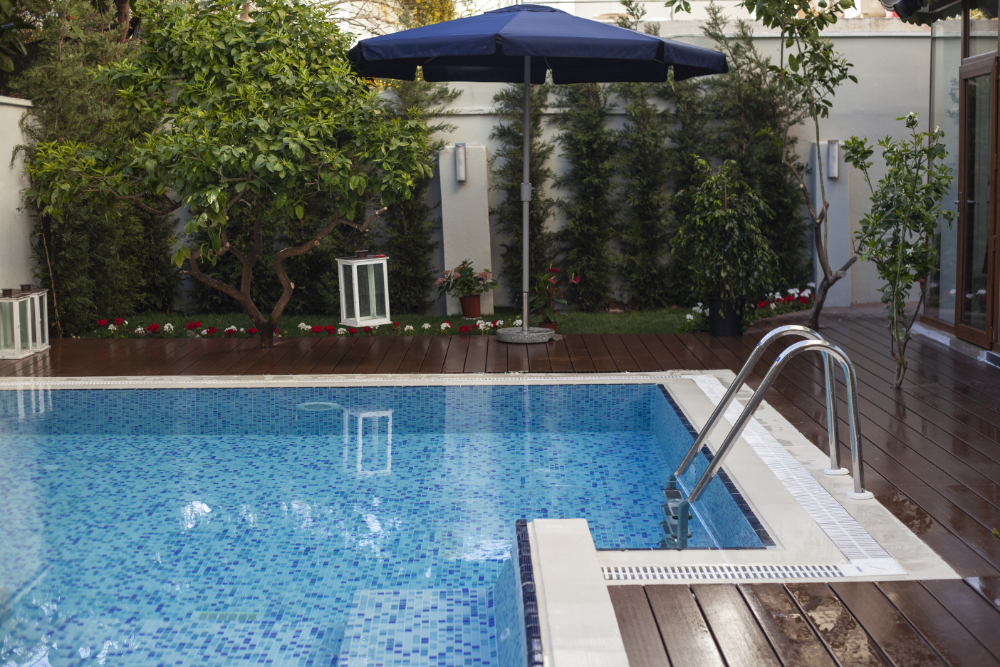An important question to consider before a pool installation is: can swimming pools be eco-friendly? We look at how to ensure your pool installation is environmentally friendly.
Can Swimming Pools Be Sustainable?
Many of us love to relax in swimming pools, especially during those warm summer months. However, how eco-friendly are our pools and can we cut down on running costs and energy usage?
Having eco-friendly pools is on the rise, with people looking for ways to improve their energy savings using pool heaters, pool pumps, and chlorine.
Chlorinated pools are ideal for cleanliness, but the associated chemicals and ongoing expenses quickly add up. To avoid rising bills and costs, more people are switching to owning natural swimming pools.
Natural pools may be common throughout Europe, but the rest of the world and the UK is only just catching up. They are much more sustainable swimming pools and offer a much simpler cleaning process. Natural swimming pools are completely chemical-free, ditching chlorine as a cleaning agent.
Energy savings are much greater with these pool types, as water is circulated into 'regeneration zones'. Aquatic plants act as water filters and boost oxygen levels during the process. This chemical-free alternative is environmentally friendly as you are not using harmful chemicals to clean pool water.
Your environmental impact is much lower, and natural pools are low maintenance compared to traditional swimming pools. You are using fewer chemicals yet keeping water clean and spending less time cleaning it.
Natural pools do require pumps to move water into these regeneration zones but are much more energy-efficient and keep swimming areas cleaner for longer.
Chlorine prices, air conditioning and heating bills are all expensive endeavours and aren't sustainable for pool owners to continue with.
Chlorine may be great at cleaning your pool, but it causes harm to the surrounding environment and organisms in the soil, water and garden.
If you can switch to a more green pool and efficient heating, you will see a significant decrease in your energy bills and be running a more sustainable pool.

What Is Eco-Friendly Swimming Pool Design
The components that make a natural pool environmentally friendly are plentiful and can save you money and time in the long run.

There is nothing worse than swimming pool water that doesn't retain its heat, and eco-pools are designed to have improved thermal insulation without costing you a fortune.
Environmentally friendly swimming looks like polystyrene blocks used in the construction of natural pools, aiding with heat retention.

Eco-pools also retain heat, staying warmer for much longer. The floor, pipework and pool walls are more thermal and pool heaters used are more efficient than traditional ones.
You can buy solar pool heaters to warm the water, ensuring that your carbon footprint is much lower.
When using a solar heater with natural pools regeneration zones, your pool usage becomes a lot more sustainable.
Types Of Eco-Swimming Pool
With many people becoming concerned with their water consumption levels and wanting to produce less energy overall, eco-swimming is becoming more popular.
There are three main types of eco-swimming pools.
Natural Pools
Natural pools are built from clay and gravel instead of concrete or fibreglass, and chlorine levels are replaced with aquatic plants. Filtration systems boost oxygen levels in the water and provide a natural habitat.
Marine life can exist simultaneously if you choose, while you still have the same levels of relaxation.
Solar Pools
Solar Pools are also on the rise, ditching traditional heaters for solar panels. With rising gas prices, more pool owners are switching to solar water heating and trying to cut down on their largest consumption factor; water heating.
There are many good reasons to make this change, as you will need less work to warm your pool and improve sustainability at your house.
Moss-Filtered Pools
Moss-filtered pools reduce the need for algaecide and chlorine through the growth of sphagnum moss filters. This provides clean air and water, promoting healthier-looking skin among swimmers.
The chemical use creates dry skin, bleached swimsuits, and staining of the walls and stairs, but the pool looks more inviting and healthier without those chemicals.
Beneficial, helpful bacteria is promoted in such pools, offering a natural habitat environment for nature to thrive while you swim and enjoy.
Making Your Pool More Environmentally Friendly
If you cannot switch to a natural pool but want to use much less energy, there are some steps you can take today.

Using Pool Covers
Pool covers have environmental impacts and benefits. They also prevent evaporation of pool water, meaning less water wastage overall.
Your energy bills will decrease as you retain heat in the water and heat it less frequently.
Investing In Cartridge Filters
This will also help keep your pool clean and can last for many years. They nullify the need to backwash the pool; therefore, you're using less water overall.
Install A Solar Heater
The initial cost can be expensive, but you will significantly lessen your environmental impact of owning a pool when heating with a solar panel.
Pool Pump Timers
Pool pump timers allow you to control the pool pump usage throughout the day, ensuring that you only use it when you have to. A large amount of energy is wasted by pumps.
Use The Right Pool Pump
You should ensure the correct flow rate, horsepower and turnover rate have been met and decided between a single speed pool pump and variable speed pump. Variable speed pumps allow you to run the pump at different speeds, ideal for when you're filtering chemicals, for example.
They are typically more cost-efficient in the long term. Single-speed pool pumps are the most common type, but many pool owners use the wrong size and cost themselves more in energy bills.

Many people are switching to saltwater pools in the hopes they are better for the environment. Contrary to popular opinion, saltwater does not remove the need for chlorine, so you use twice as many products and chemicals.
The salt can damage your garden and surrounding plants when swept up in the wind and can create health problems when drank by pets.
If you are concerned about your impact on nature and your electricity and heating expenses, you should not switch to a saltwater pool and instead make the above changes to your current swimming pool.
Natural swimming pools are the future, being easier to maintain and providing an aesthetic environment for you and your family.
They can stay hot with cheaper, more environmentally friendly means and contribute to the care of the planet.
If you are looking for hydrotherapy pool installation in Edinburgh, Glasgow & Aberdeen area contact us today on Midlothian Indoor Pools to discuss your project.
